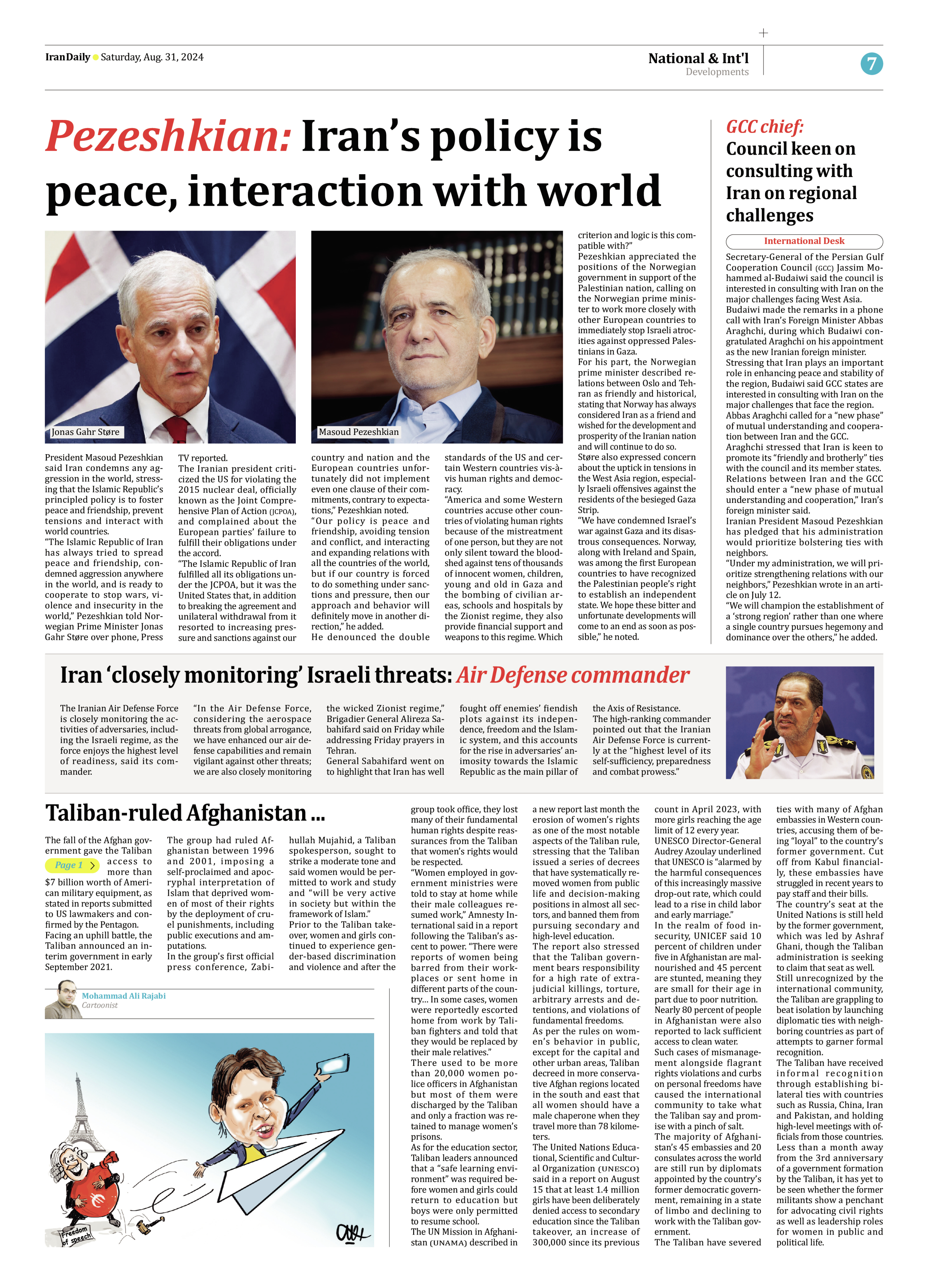
Taliban-ruled Afghanistan ...
Page 1
The fall of the Afghan government gave the Taliban access to more than $7 billion worth of American military equipment, as stated in reports submitted to US lawmakers and confirmed by the Pentagon.
Facing an uphill battle, the Taliban announced an interim government in early September 2021.
The group had ruled Afghanistan between 1996 and 2001, imposing a self-proclaimed and apocryphal interpretation of Islam that deprived women of most of their rights by the deployment of cruel punishments, including public executions and amputations.
In the group’s first official press conference, Zabihullah Mujahid, a Taliban spokesperson, sought to strike a moderate tone and said women would be permitted to work and study and “will be very active in society but within the framework of Islam.”
Prior to the Taliban takeover, women and girls continued to experience gender-based discrimination and violence and after the group took office, they lost many of their fundamental human rights despite reassurances from the Taliban that women’s rights would be respected.
“Women employed in government ministries were told to stay at home while their male colleagues resumed work,” Amnesty International said in a report following the Taliban’s ascent to power. “There were reports of women being barred from their workplaces or sent home in different parts of the country… In some cases, women were reportedly escorted home from work by Taliban fighters and told that they would be replaced by their male relatives.”
There used to be more than 20,000 women police officers in Afghanistan but most of them were discharged by the Taliban and only a fraction was retained to manage women’s prisons.
As for the education sector, Taliban leaders announced that a “safe learning environment” was required before women and girls could return to education but boys were only permitted to resume school.
The UN Mission in Afghanistan (UNAMA) described in a new report last month the erosion of women’s rights as one of the most notable aspects of the Taliban rule, stressing that the Taliban issued a series of decrees that have systematically removed women from public life and decision-making positions in almost all sectors, and banned them from pursuing secondary and high-level education.
The report also stressed that the Taliban government bears responsibility for a high rate of extrajudicial killings, torture, arbitrary arrests and detentions, and violations of fundamental freedoms.
As per the rules on women’s behavior in public, except for the capital and other urban areas, Taliban decreed in more conservative Afghan regions located in the south and east that all women should have a male chaperone when they travel more than 78 kilometers.
The United Nations Educational, Scientific and Cultural Organization (UNESCO) said in a report on August 15 that at least 1.4 million girls have been deliberately denied access to secondary education since the Taliban takeover, an increase of 300,000 since its previous count in April 2023, with more girls reaching the age limit of 12 every year.
UNESCO Director-General Audrey Azoulay underlined that UNESCO is “alarmed by the harmful consequences of this increasingly massive drop-out rate, which could lead to a rise in child labor and early marriage.”
In the realm of food insecurity, UNICEF said 10 percent of children under five in Afghanistan are malnourished and 45 percent are stunted, meaning they are small for their age in part due to poor nutrition.
Nearly 80 percent of people in Afghanistan were also reported to lack sufficient access to clean water.
Such cases of mismanagement alongside flagrant rights violations and curbs on personal freedoms have caused the international community to take what the Taliban say and promise with a pinch of salt.
The majority of Afghanistan’s 45 embassies and 20 consulates across the world are still run by diplomats appointed by the country’s former democratic government, remaining in a state of limbo and declining to work with the Taliban government.
The Taliban have severed ties with many of Afghan embassies in Western countries, accusing them of being “loyal” to the country’s former government. Cut off from Kabul financially, these embassies have struggled in recent years to pay staff and their bills.
The country’s seat at the United Nations is still held by the former government, which was led by Ashraf Ghani, though the Taliban administration is seeking to claim that seat as well.
Still unrecognized by the international community, the Taliban are grappling to beat isolation by launching diplomatic ties with neighboring countries as part of attempts to garner formal recognition.
The Taliban have received informal recognition through establishing bilateral ties with countries such as Russia, China, Iran and Pakistan, and holding high-level meetings with officials from those countries.
Less than a month away from the 3rd anniversary of a government formation by the Taliban, it has yet to be seen whether the former militants show a penchant for advocating civil rights as well as leadership roles for women in public and political life.







